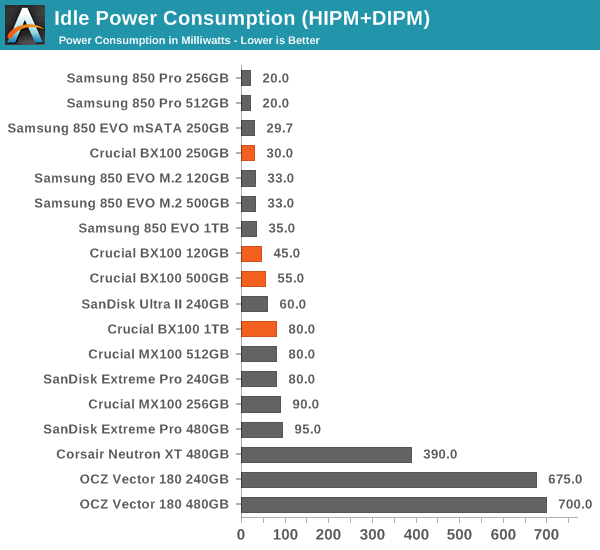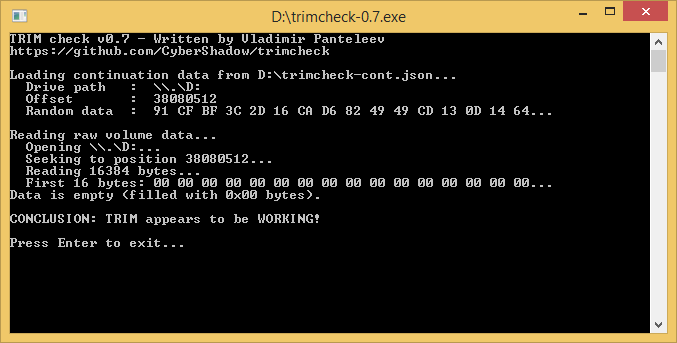Crucial BX100 (120GB, 250GB, 500GB & 1TB) SSD Review
by Kristian Vättö on April 10, 2015 1:20 PM EST- Posted in
- Storage
- SSDs
- Crucial
- Micron
- Silicon Motion
- BX100
- SM2246EN
- Micron 16nm
Idle Power Consumption
Since we truncate idle times to 25µs in our Storage Bench traces, they don't give a fully accurate picture of real world power consumption as idle power consumption is not taken properly into account. Hence I'm still reporting idle power consumption as a separate benchmark because it's one of the most critical metrics when it comes evaluating an SSD for mobile use.
Unfortunately I still don't have a way to test DevSleep power consumption due to lack of platform support, but my testbed supports HIPM+DIPM power commands (also referred to as Slumber power), so the results give a rather accurate picture of real-world idle power consumption.

We've already seen that the BX100 is super efficient under load and what makes the news even better is that it also has excellent power consumption in idle/slumber mode. The BX100 seems to be an ideal fit for a laptop with its efficient power characteristics.
TRIM Validation
The move from Windows 7 to 8.1 introduced some problems with the methodology we have previously used to test TRIM functionality, so I had to come up with a new way to test. I tested a couple of different methods, but ultimately I decided to go with the easiest one that can actually be used by anyone. The software is simply called trimcheck and it was made by a developer that goes by the name CyberShadow in GitHub.
Trimcheck tests TRIM by creating a small, unique file and then deleting it. Next the program will check whether the data is still accessible by reading the raw LBA locations. If the data that is returned by the drive is all zeros, it has received the TRIM command and TRIM is functional.
And TRIM works.











67 Comments
View All Comments
stickmansam - Friday, April 10, 2015 - link
Any thoughts on how performance would be like if the BX100 didn't have the Samsung like OP?bricko - Friday, April 10, 2015 - link
Been researching ssd for a bit, these seem ok, but after watching the Intel discussion of their massive new Intel 750 NVMe, PCIe 3, 1.2 Tb will make one cry, 2-4 times the speed of these old SATA stuff. Half height card for pcie slot. But massive cost, like 1100 for the 1.2 Tb, but the charts are scary. Better with new X99 mobohttp://www.pcper.com/reviews/Storage/Intel-SSD-750...
http://www.anandtech.com/show/9090/intel-ssd-750-p...
Sunburn74 - Saturday, April 11, 2015 - link
But no real world performance benefit for 99% of us.just4U - Friday, April 10, 2015 - link
I think the only real problem I have with the BX100 is ... believe it or not pricing. Here in Canada I've bought 4 of these drives but I've had to scour the net for price match deals to even come close to the MX100 which.. actually was 10-20% lower in costs. Ticks me off really.. their coming close to price parity with the older model but still not there yet.. The Sandisc Ultra2 is cheaper but it's almost always out of stock.. they tried to price this damn thing like the higher end drives. :(stickmansam - Saturday, April 11, 2015 - link
Canada has always suffered by worse off pricing and stock issues.frombauer - Saturday, April 11, 2015 - link
Would this be a tangible empirical upgrade over a 256GB Samsung 840 Pro?Margalus - Saturday, April 11, 2015 - link
no, nothing you would be able to notice in usage.Morawka - Saturday, April 11, 2015 - link
whats up with the 850 EVO scores? do you guys only have laptop drives or something? Wanted to see how it compares to a 2.5" 850 Evo, and obviously the Msata scores dont compare to it.Kristian Vättö - Saturday, April 11, 2015 - link
I haven't had time to put the 2.5" 850 EVOs through our new SSD suite yet, but I have the scores for the mSATA/M.2 versions since we just reviewed those. The performance should essentially be the same though since the hardware is no different.Nordlicht - Saturday, April 11, 2015 - link
It would have been nice to have BX100 being compared to Transcend SSD370. Both use the same controller. However, SSD370 uses Micron's 20nm NAND whereas BX100 uses the next generation 16nm. Performance is similar?On the surface the SSD370 could be more reliable due to bigger feature size. BX100 commands a small price premium, though.